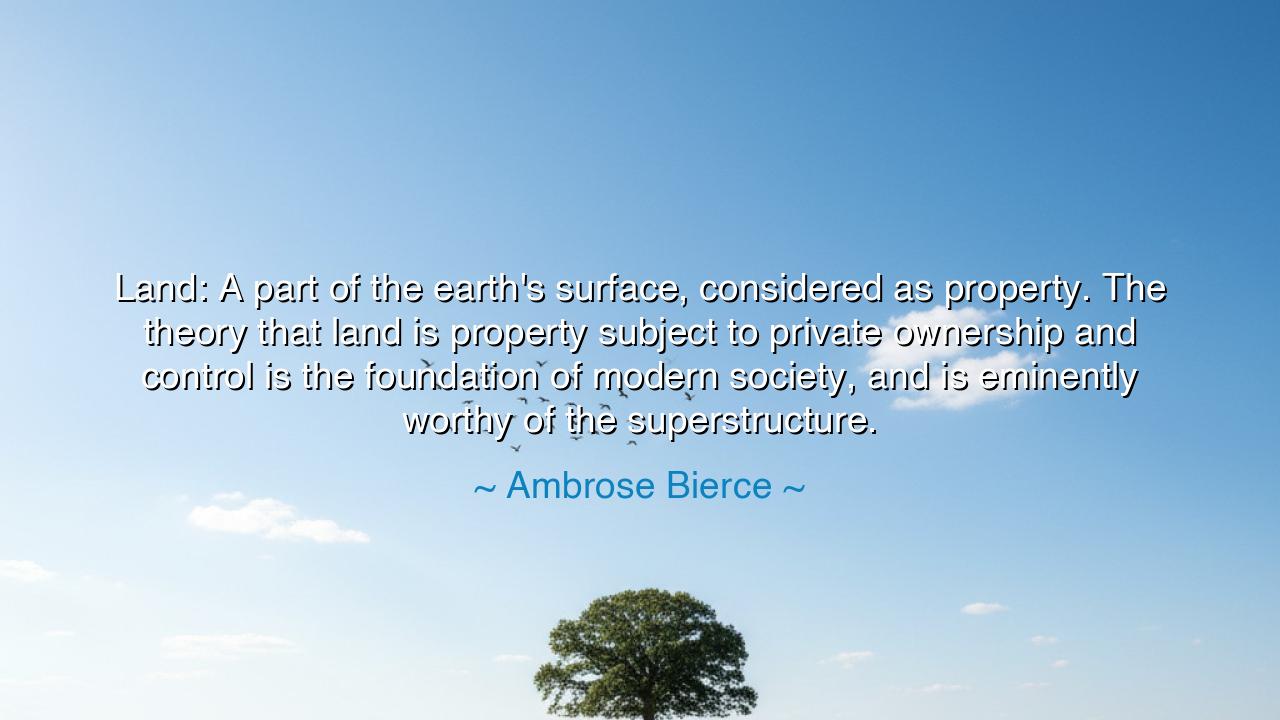
Land: A part of the earth's surface, considered as property. The
Land: A part of the earth's surface, considered as property. The theory that land is property subject to private ownership and control is the foundation of modern society, and is eminently worthy of the superstructure.






"Land: A part of the earth's surface, considered as property. The theory that land is property subject to private ownership and control is the foundation of modern society, and is eminently worthy of the superstructure." These words by Ambrose Bierce carry with them a piercing critique of the very foundation of modern society—the concept of private land ownership. Bierce, known for his sharp wit and caustic observations, points out that our belief in land as property, something that can be bought, sold, and controlled by individuals, is not just a matter of economic transaction but a central tenet that upholds the structure of society itself. He suggests that this idea—the notion of ownership over a piece of the earth—forms the very foundation of all the systems of power, hierarchy, and control that govern our world.
In the ancient world, the concept of land ownership was often tied to power, lineage, and divine right. Consider the Egyptian pharaohs, who were believed to be divine rulers with dominion over the land and everything upon it. The land was theirs by right, a gift from the gods, and their rule was legitimized by this ownership. Similarly, in the Roman Empire, land was a symbol of wealth and influence, often passed down through families and controlled by the elite. The peasants, who worked the land, had no ownership of it and lived under the control of those who claimed it as their property. Land, in these early societies, was not just a material asset but a symbol of divine and social power, reinforcing the stratified nature of these civilizations.
Bierce’s words challenge this ancient belief, calling attention to the fact that land ownership, as it is understood in modern times, has evolved into a fundamental element of capitalism and social control. In the modern era, the concept of private property—especially the land that we walk upon—is seen as a natural right. Yet Bierce’s critique suggests that this view is not self-evident, but rather a construct that supports the superstructure of society. The control of land is not just about owning a piece of the earth; it is about power, the ability to shape the environment, to create class divisions, and to dictate the terms upon which individuals can live, work, and survive. Land has become a symbol of ownership in the most literal sense, but also of social hierarchy and economic dominance.
Consider the example of land reform movements throughout history. In Latin America, for instance, the Zapatista movement in Mexico in the early 20th century fought for the redistribution of land to peasants and indigenous peoples, who had long been dispossessed of their rights to the land by wealthy landowners and foreign corporations. These movements highlight how the control of land has been central to the maintenance of economic inequality. The Zapatistas fought not just for access to resources, but for the very dignity and autonomy that landownership can confer. The struggle over land, both historically and in modern times, has often been a struggle for justice—a call for those who have been excluded from the benefits of land to reclaim what is rightfully theirs.
Similarly, in the United States, the Homestead Act of the 19th century promised free land to settlers, yet this land distribution was often done at the expense of native peoples, whose connection to the land went back for generations. The narrative of land ownership as manifest destiny drove the expansionist policies of the nation, leading to the violent displacement of indigenous peoples. This is a stark reminder of the ways in which land ownership has been used as a tool of power and domination, perpetuating systems of exploitation and injustice.
Bierce’s observation about land being the “foundation of modern society” is especially poignant when viewed in light of these historical examples. The superstructure of our societies—the legal systems, the economic frameworks, the political structures—are built upon this notion of land ownership. The elite class, who controls the land, often controls the wealth, the production, and the distribution of resources. This system creates a world in which those without access to land are subjugated, relegated to the margins of society, their freedom and opportunity limited by the control of others over the most basic resource: the land itself.
The lesson that Bierce offers us is one of awareness—the understanding that the concept of land ownership is not an inherent truth but a construct that upholds the very structure of society. We must ask ourselves: who truly benefits from the idea of private property? Who holds the power in a world where land is treated as a commodity, and who suffers when that power is concentrated in the hands of the few? Land, in its most basic sense, should be seen as a resource for all to share, not a tool of dominance used to perpetuate inequality.
In our own time, we must reconsider the way we view land—not just as an object to be bought, sold, or used for profit, but as a common heritage that all people are entitled to enjoy and care for. Whether through land reform, sustainable practices, or community-driven initiatives, we must shift the focus from ownership to stewardship, recognizing that our responsibility is not just to possess the land, but to care for it and share it in ways that promote equity and justice for all. For in the end, land is not just a commodity—it is the foundation upon which the very future of our societies rests.






AAdministratorAdministrator
Welcome, honored guests. Please leave a comment, we will respond soon